
The superfamily Papilionoidea contains all the butterflies except for the moth-like Hedyloidea.

Riodinidae is the family of metalmark butterflies. The common name "metalmarks" refers to the small metallic-looking spots commonly found on their wings. There are 1532 species and 146 genera of metalmark butterflies in the world. Although mostly neotropical in distribution, the family is represented both in the Nearctic and the Palearctic.

Miletinae is a subfamily of the family Lycaenidae of butterflies, commonly called harvesters and woolly legs, and virtually unique among butterflies in having predatory larvae. Miletinae are entirely aphytophagous. The ecology of the Miletinae is little understood, but adults and larvae live in association with ants, and most known species feed on Hemiptera, though some, like Liphyra, feed on the ants themselves. The butterflies, ants, and hemipterans, in some cases, seem to have complex symbiotic relationships benefiting all.
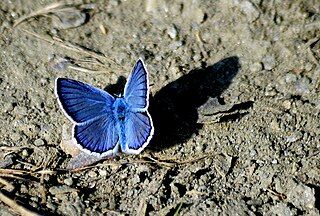
Polyommatinae, the blues, are a subfamily of gossamer-winged butterflies (Lycaenidae). It was long used to assign taxa of unclear relationships, and its contents are in need of revision. Several genera might not even belong here.
The Oxylidini are a small tribe of butterflies in the family Lycaenidae. It is alternatively treated as a subtribe, Oxylidina, of the Theclini.

Powellana is a genus of butterflies in the family Lycaenidae, endemic to the Afrotropical realm. Powellana is monotypic, containing the single species Powellana cottoni found in Cameroon, the Republic of the Congo, the Democratic Republic of the Congo and Uganda.
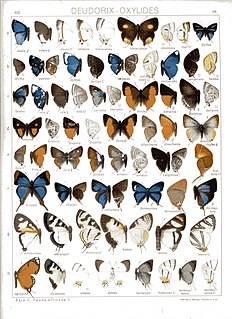
Syrmoptera is a genus of butterflies in the family Lycaenidae. They are found in the Afrotropic ecozone.
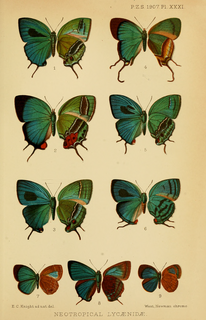
Hamilton Herbert Charles James Druce was an English entomologist who specialised in Lycaenidae and to a lesser extent Hesperiidae. He is not to be confused with his father, the English entomologist Herbert Druce (1846–1913) who also worked on Lepidoptera.

Deudorix caliginosa, the dark brown playboy, is a butterfly in the family Lycaenidae. It is found in Ivory Coast, Ghana, southern Nigeria, Cameroon, Bioko, Sao Tome & Principe, the Republic of the Congo, Uganda, western Kenya, north-western Tanzania, Malawi, Zambia, Mozambique and eastern Zimbabwe. The butterfly's habitat is forest.

Pseudaletis antimachus is a butterfly in the family Lycaenidae. It is found in Sierra Leone, Nigeria, Cameroon, Gabon, the Republic of the Congo, the Central African Republic, the Democratic Republic of the Congo, Uganda and Tanzania.

Aphnaeus orcas, the common highflier or common silver spot, is a butterfly in the family Lycaenidae. It is found in Senegal, the Gambia, Guinea-Bissau, Guinea, Sierra Leone, Liberia, Ivory Coast, Ghana, Nigeria, Cameroon, Gabon, the Republic of the Congo, Angola, the Central African Republic, the Democratic Republic of the Congo, Uganda, western and south-western Kenya, Tanzania and Zambia. The habitat consists of forests.

Pseudonacaduba aethiops, the dark line blue or dark African line blue, is a butterfly in the family Lycaenidae. It is found in Nigeria, Cameroon, Equatorial Guinea, Gabon, northern Angola, the Democratic Republic of the Congo, Uganda, western Kenya, western Tanzania and Zambia. The habitat consists of forests.

Oxylides faunus, the common false head, is a butterfly in the family Lycaenidae. It is found in Guinea-Bissau, Guinea, Sierra Leone, Liberia, Ivory Coast, Ghana, Togo, Nigeria and Cameroon. The habitat consists of primary forests.
Syrmoptera bonifacei, the Boniface's false head, is a butterfly in the family Lycaenidae. It is found in Nigeria, Cameroon and the Republic of the Congo. The habitat consists of forests.
Syrmoptera caritas is a butterfly in the family Lycaenidae. It is found in the Central African Republic.
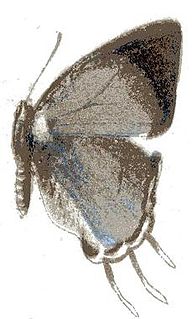
Syrmoptera homeyerii is a butterfly in the family Lycaenidae. It is found in the Democratic Republic of the Congo and Angola.
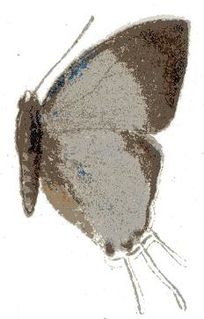
Syrmoptera melanomitra is a butterfly in the family Lycaenidae. It is found in Cameroon, Gabon, the Republic of the Congo and the Democratic Republic of the Congo.
Syrmoptera mixtura is a butterfly in the family Lycaenidae. It is found in the Democratic Republic of the Congo.

















